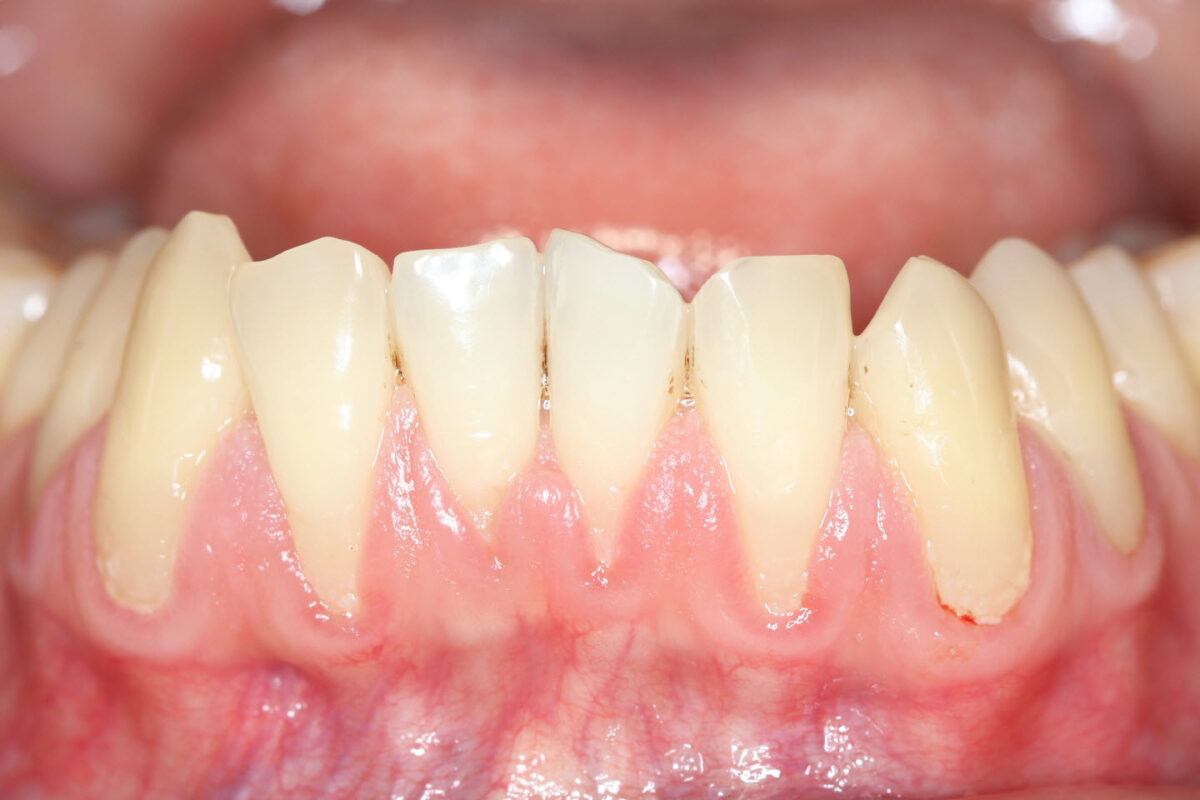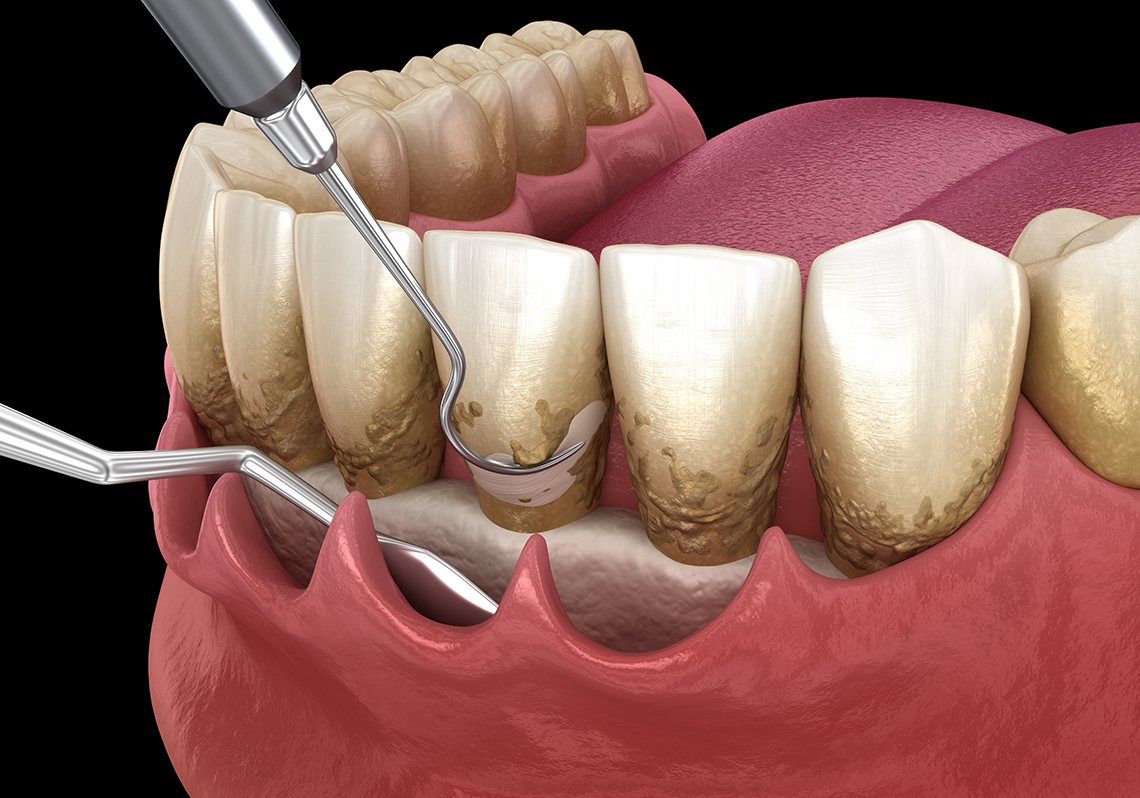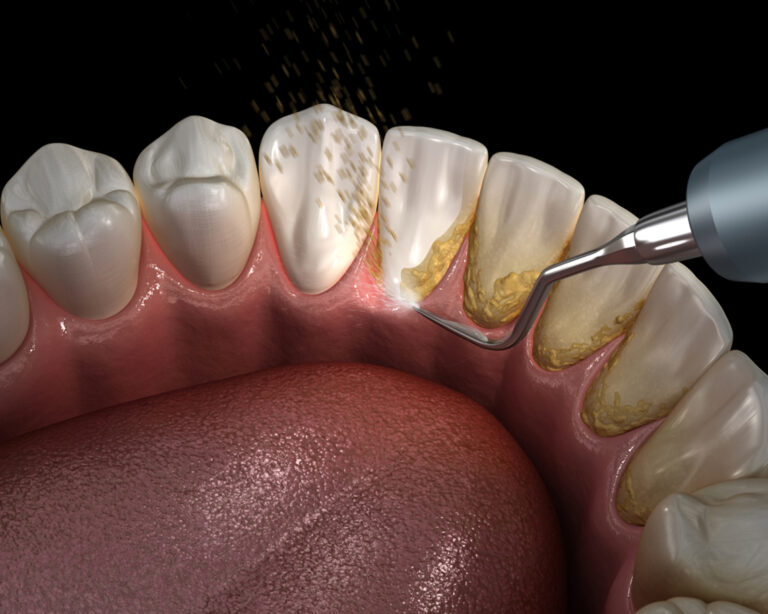Periodontal Therapy
What is periodontal (Gum) therapy?
Periodontal disease is the loss of jaw bone around your teeth caused by bacteria in your mouth. Bone loss is an irreversible process. If too much bone is lost around your teeth, your teeth will become loose and lost. Persons with periodontal disease have too many bacteria (that cause inflammation) around their teeth to cope with their immune system. These bacteria cover your teeth’ roots in a “biofilm” layer. They are above and below the gum margin in the gum pocket around your teeth. Usually, rough deposits of calculus (tartar) make complete removal of these bacteria from your teeth impossible without professional help (scaling and debridement).

What is the Aim of Periodontal Therapy?
The treatment aims to make all your teeth as smooth as possible by removing any calculus (tartar) from the roots of the teeth and any rough edges from old fillings. Areas where food catches or jams/lodges also need to be attended to.
Once your teeth are as smooth as possible, it is your job to keep everything clean with a toothbrush, dental floss and Pikster/IP brushes (interproximal brushes) every day. We will show you how to do this.
What is done during Periodontal (gum) Therapy?
Under local anesthetic, the teeth are cleaned of calculus (tartar) using ultrasonic instruments and hand scalers. Rough edges on old fillings are removed using polishing burs. Old fillings that are catching food may need to be replaced or modified.
Antibiotics may be prescribed
For patients with severe problems or who are in a high-risk category. These antibiotics are started 1 hour before treatment. Some antibiotics react badly with alcohol, so it may be that you cannot drink alcohol for five days while you are taking the antibiotic course. Painkillers (Panadol, Nurofen or Codeine) may be recommended, before and after treatment, to make the surgery and recovery more comfortable.
If you are apprehensive about treatment, you can be prescribed a mild sedative (Oral Valium/ Diazepam) to be taken an hour pre-operatively. However, you will not be able to drive nor operate machinery for the remainder of the day. You will need to be accompanied to and from your appointment by a responsible adult.
During Treatment
Once the teeth are fully anaesthetized, no pain should be felt at all during treatment. You will NOT be expected to feel any pain, and all necessary measures will be taken to ensure your comfort. Sometimes dissolving sutures (stitches) may be placed to ensure better healing.
Immediately after treatment
Your will be VERY numb and should not attempt to eat until the anesthetic wears off, in case you bite your cheek, lip or tongue. For some people, the anesthetic may last several hours after treatment.
The rest of that day
Strenuous exercise should be avoided on the day as this will increase pain and may start bleeding. Soft but nutritious food is recommended. Hot, cold and acidic foods should be avoided for the first few days
That night
Use the recommended mouthwash (es) and take the painkillers (if appropriate) but do not clean the teeth treated. They will be too sore.
The next day
Use the recommended rinses in the morning and evening and the antibiotics as prescribed. Start GENTLE but thorough cleaning, especially with dental floss and Pikster brushes. THIS IS VERY IMPORTANT. Often an electric toothbrush will be too sore from using at first, so a soft-bristled brush is recommended.
Post-Operative Complications
It is common for your teeth to be sensitive to hot AND ESPECIALLY TO COLD drinks and foods for the first few days or even weeks. This sensitivity will gradually subside. PROVIDED YOU CLEAN YOUR TEETH AS INSTRUCTED and that you use the fluoride mouthwash that we have recommended. There will be gum shrinkage in deep pocketing areas where the bone loss was most significant, which may lead to GAPS appearing between your teeth. Unfortunately, this gum shrinkage is inevitable and permanent. The bone lost due to the disease will not return, but treatment will help to prevent its progression.

First Review of healing
After three months, we perform a light cleaning of all your teeth to remove any new accumulated plaque and check that the gums are healthy. This is usually a 45-60-minute appointment with the dentist or dental hygienist. Any areas that are still inflamed can be identified and remedied.
Long Term Periodontal maintenance
It is essential that regular professional cleaning is performed on a regular and long-term basis. This maintenance might be three-monthly, four monthly or six-monthly, depending on the severity of your disease and the standard of your cleaning at home. The better you clean and floss, the less professional maintenance you will need.
Maintenance cleans are usually undertaken by a dental hygienist to reduce your costs. All the research worldwide shows that the most common cause of periodontal treatment being unsuccessful in the long-term is that patients fail to have regular maintenance cleaning.
Continuing to smoke is also a prevalent cause of failure.
Smoking and Periodontal Treatment
It is very well documented that most smokers DO NOT HEAL as well as non-smokers or reformed smokers. Periodontal treatment for smokers often leads to far more post-operative sensitivity and discomfort than others, and healing will be less predictable. Patients who cannot quit smoking are best advised to cut down as much as possible before any treatment and that their treatment may not be successful. Some studies suggest that low-level smoking (less than five cigarettes a day) has only a small effect on healing, but these patients must be almost perfect with their cleaning. Our advice is to stop smoking altogether, if possible for at least one month before treatment, to allow the immune system in your mouth to recover and to enable your gums to heal properly.
Periodontal Disease and Heart Disease
There is definite medical evidence that “advanced” periodontal disease is an additional risk factor in Heart Disease in the same way that smoking, being overweight, and high cholesterol is risk factors. Bacteria from the mouth have been found in heart tissue in patients who have had heart attacks. This happens because, in ” Advanced” and “Very Advanced” diseases, there are so many bacteria around the teeth that they get into the general bloodstream, causing bacteremia or infection of the blood.
Whilst this does NOT mean that you will die from periodontal disease, you must be aware that severe periodontal disease is NOT suitable for your general health.

Frequently Asked Questions
What might happen if I decide to do nothing about the disease?
Periodontal disease is a PROGRESSIVE disease in that you will continue to lose bone until the bacteria on the roots of your teeth are brought under control. ‘
In almost every case, the disease will progress from “Early” to ” Moderate” to ” Advanced” to “Very Advanced” illness over the years. Usually, the disease accelerates considerably from the “advanced” to the ” very advanced” stages.
What improvements will I notice after treatment?
Most commonly, patients comment that their teeth feel smooth, the gums don’t bleed, the gums are not sore, that their partner says that they don’t have bad breath anymore, their teeth are easy to clean and floss, don’t catch food that their teeth “feel heaps better”.
What negative things will I notice after treatment?
Most common negative comments: sensitivity to cold drinks for a week or more post-operatively, teeth tender to chew on for a week, sore gums for the first few days, GAPS APPEARING BETWEEN TEETH where the damage was worst, food catching in the bigger spaces between the teeth as the gums heal, a low rebate from Health Fund.
Can't I take antibiotics to fix the problem?
No. The worldwide periodontal research and studies show that antibiotics taken alone, without thorough cleaning of calculus from your teeth’ roots, are ineffective at stopping the disease and may lead to a periodontal abscess.
Can you save all my teeth forever?
Treatment of ” Early” and ” Moderate” disease is usually very successful if the dentist and patient do their jobs well. “Advanced” disease is certainly less predictable and requires that patients be quite excellent with their cleaning at home. Average cleaning may not be good enough to stop the condition from recurring in some areas.
Most teeth that have “Very Advanced” disease are noticeably loose. Treatment outcomes of ” Very Advanced” disease will entirely depend on the patient being fanatical about cleaning. Whilst very severely damaged teeth may be kept for many years, some of these teeth may be lost after 1, 2, 5 or 10 years. It is unlikely that these teeth will be kept for life. There is not enough bone left.
Can I have all my teeth out?
Well, this will certainly get rid of your periodontal disease as well as all your teeth. Unfortunately, many people find that they are disappointed with dentures (false teeth) as they can’t manage them very well for eating. Some people can’t wear dentures at all and have a terrible time. Younger patients seem to cope better with dentures.
Can I get my bad teeth out and dental implants put in instead?
Recent dental evidence shows that the same bacteria that cause problems with natural teeth can cause bone loss around dental implants. These patients will have an increased risk of dental implant-associated infection (peri-implantitis)
I have a very loose tooth. Can it be saved?
If a tooth is very loose, there is not enough bone present to cope with the forces on the tooth during eating. Sometimes it is possible to “splint” the tooth to its ‘neighbouring tooth using a tooth-coloured resin glue so that the tooth does not fall out. This is much more likely to be possible on a front tooth than a back one.
Why does it take so long for the dentist to clean all my teeth?
When patients have periodontal disease, all tartar must be removed from the roots. In other words, every tooth has to be cleaned, 360 degrees around each tooth, front and back, above and below the gum line. Most back teeth are challenging to get at, especially wisdom teeth. Many patients require an appointment of 2-3 hours to clean the upper teeth and 2-3 hours to do the lowers.
Which teeth are most often affected? The front teeth or the back ones?
This varies from person to person, but almost always, the back teeth have more damage than the front ones as these back teeth are more difficult for you to clean with a toothbrush and floss and will have had more bacteria around them for longer.
Are some people more likely to get the disease?
Yes! Some people do not get periodontal disease as their immune systems seem to fight the bacteria almost entirely. A periodontal study in Brisbane suggests that 10% of the population can get the disease badly. Factors that might make a person more likely to get the disease badly include a Family History of periodontal disease, diabetes, thyroid gland disease and immune system problems. Some teeth have a natural shape that is difficult to clean and collects more plaque than usual.
Smoking is a significant factor in making the disease worse.
Some ethnic groups (especially some Asian populations) have an exceptionally high-risk factor. However, most people can get periodontal disease if they have enough old plaque (bacteria) around their teeth for a long time.
Can I pass the disease on to my partner or family?
No. Because the disease is caused by bacteria that do not exist (and cannot survive) in a healthy mouth, any bacteria passed on cannot survive in another mouth unless that other person has the disease already!!
Will my Health Fund cover me for some of the costs of treatment?
The Health Funds vary tremendously in the rebates they might pay and whether they will cover you at all. Most Health Funds seem to regard periodontal disease as relatively unimportant and give a low rebate. Some Health Funds will give almost 80% back. We will give you an itemized estimate of treatment costs before treatment commences to check with your Fund as to the exact rebate you might receive.
Does my periodontal treatment have to be done immediately?
Usually, gum disease is only slowly progressive. Whilst it is ideal to have the treatment done as soon as possible, often patients need to arrange their work schedule, finances etc. If you have pain or acute infection, usually the sooner treatment is done, the better. A delay of a few months may make little difference in other cases. This is often relevant for patients trying to give up smoking before treatment. The most important thing is that things are correctly done by the dentist and the patient whenever the treatment is done.




































